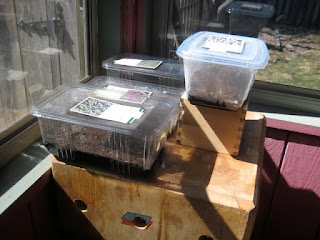On the Friday before Christmas, sometime shortly after I left for the office, Mattie the cat met her demise.
Being hit by a car was a surprising and violent end for this skittish, needy and endlessly person-oriented animal. She fled in fear from any footstep (It's not about you Mattie...). She drooled on me almost daily. She used her jaw as a front-end loader to scrape up heaps of cat food, and inevitably barfed it up later, barely chewed. She meowed at me, constantly. I had to periodically stop talking back to her, when the meowing really got out of hand. (Hreh, hreeowww)
She was fat. Small head, very round body. She got thin (well, thinner) in the summer after we moved to the new house, because she got more running and hunting in. But in preparation for winter, she had packed the weight back on. I referred to her as my keishke.
Mattie was equal parts endearing and annoying. If nothing else, she had a strong dose of personality. And she loooooooooved us. (reference the drooling). It was impossible to sit down without her jumping in your lap. Every pair of slacks I own has the rents and snags to prove it. Every night, she draped her chubby little self over my shoulder or my hip, and purred and drooled her way through the night. In spite of myself, I loved her back, as much as she loved me.
We invented all kinds of amusing adventures and stories. We have a special voice for her. (Um, so anyways... everything ends in questions?...) In our imaginary world, Mattie started a ladies' gym called Narrow Miss. The first location was in Burnips. She went on to run a temp agency, and to take contract work as a receptionist and business identity specialist. She was superb at coming up with funny names for companies. (Omer Goodness, Mattie speaking)
Mattie understood the give and take of relationship. She loved us no matter what. She let us know when she was unhappy (pretty sure she's behind the poop-storm we came home to after our vacation), but in the end, it never changed the look on her face when I stopped to meow back at her.
She's in the ground now, under a favorite tree. I'll plant some catmint there in the spring, when I remove the pine boughs we used to cover the bare earth.
Her companions miss her. Pips, cat roommate of almost 11 years. Gribby, her first idol. Kevin, her nemesis and object of fascinated affection. Me, her cat-mom and favorite lap.
Update, 12/31, my birthday... found a few more photos of the dince-rat (pron. dynse - rate, inspired by the fact that she was small and somewhat mattie-rattie).










